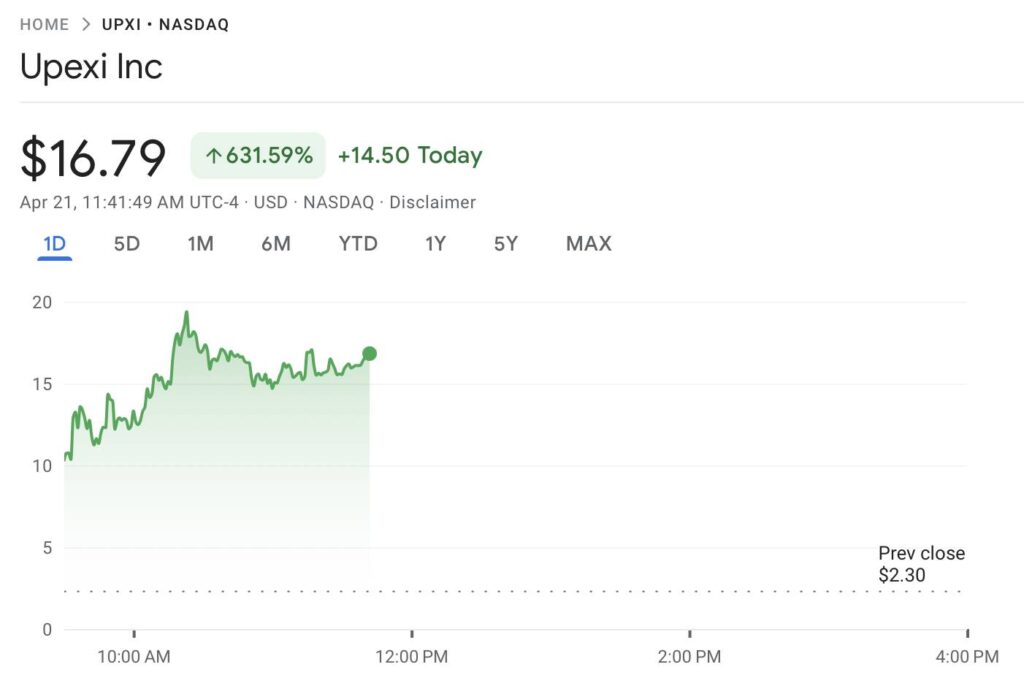In a significant move that highlights the ongoing evolution of the cryptocurrency landscape, Upexi, a company renowned for its expertise in supply chain management, is making bold strides into the world of digital currencies. On April 21, Upexi announced an impressive $100 million funding round, with a staggering 90% of the capital dedicated to establishing a treasury strategy centered around Solana (SOL), a prominent cryptocurrency.
Since the announcement, Upexi’s shares have dramatically surged from a closing price of $2.30 on April 17 to an astonishing $16.79, representing a remarkable increase of 632% in just one day.
This funding round saw participation from a host of well-known crypto venture capital firms, including the family office of former BitMEX CEO Arthur Hayes and other notable players like Delta Blockchain Fund, Delphi Ventures, and Hivemind. The company completed the round by selling approximately 44 million shares of common stock at a price of $2.28.
Despite its ambitious new direction, Upexi’s financial performance has shown a dip, with a posted profit of $3 million in the last quarter of 2024, reflecting a decrease of 34.8% or $4.6 million compared to the same period in 2023. This indicates a complex landscape as the firm pivots into an industry known for its volatility.
Upexi joins a growing number of companies adopting innovative treasury strategies, similar to the approach pioneered by Strategy (formerly MicroStrategy), which has become synonymous with Bitcoin investments. Strategy was a trailblazer in this arena, having started its Bitcoin purchases back in August 2020, and it has since influenced over 13,000 companies to explore similar paths.
While Bitcoin remains the go-to asset for many firms, Upexi’s focus on SOL showcases a shift toward diversifying cryptocurrency holdings. Janover, another company transitioning to a crypto treasury strategy, recently acquired $10.5 million worth of SOL, joining Upexi in embracing Solana’s potential as the blockchain continues to garner attention for its speed and use in various applications, including decentralized finance and memecoins.
With Solana’s reputation as a “fast and efficient” blockchain, oft dubbed the “Ethereum killer,” Upexi’s entry into this space certainly sets the stage for intriguing developments in the months to come, as more companies assess their strategies amid a booming cryptocurrency market.
Upexi’s Diversification into Cryptocurrency: Key Highlights
The recent announcement regarding Upexi’s foray into the cryptocurrency sector marks a significant shift for the company, impacting both its share value and the broader market. Here are the key points to consider:
- $100 Million Raise:
- Upexi announced a substantial $100 million raise, with over 90% allocated for building a Solana treasury strategy.
- This strategic move indicates a strong commitment to integrating cryptocurrency into its business model.
- Share Value Surge:
- Following the announcement, Upexi’s shares soared from $2.30 to $16.79, reflecting a remarkable 632% increase in a single day.
- This jump could signal investor confidence in the company’s new direction and the potential profitability that comes with cryptocurrency investments.
- Prominent Venture Capital Backing:
- The company received support from notable crypto venture capital firms, further legitimizing its new strategy.
- Involvement of firms like Delta Blockchain Fund and Delphi Ventures suggests strong interest from established players in the crypto space.
- Comparison to Strategy (MicroStrategy):
- Upexi’s move mimics the strategy of other companies, like Strategy, that integrated cryptocurrency into their financial strategies.
- Historically, companies adopting crypto treasury strategies have seen substantial stock price increases, indicating potential long-term benefits.
- Emerging Competition in Crypto Treasury:
- Other companies, like Janover, are also pivoting towards cryptocurrency, indicating a trend in diversifying corporate treasury strategies beyond traditional assets.
- The success of these companies could inspire further adoption of crypto strategies, affecting market dynamics.
- Solana’s Growing Influence:
- Upexi’s focus on Solana (SOL) highlights the growing recognition of alternative cryptocurrencies beyond Bitcoin.
- Solana is praised for its fast transaction speeds and diverse applications, positioning it as a competitive player in the crypto landscape.
- Impact on Crypto Market Trends:
- The shift towards incorporating cryptocurrencies within corporate strategies may lead to increased institutional acceptance of digital assets.
- Readers should monitor these trends, as they can influence investment strategies and market stability.
“The rise of companies like Upexi in the crypto space emphasizes the ongoing evolution of the financial landscape, making it crucial for both investors and consumers to stay informed.”
Upexi’s Bold Move into Cryptocurrency: Opportunities and Risks
Upexi’s recent pivot into the cryptocurrency realm is stirring significant buzz, particularly following their impressive $100 million fundraising initiative. With a substantial commitment directed towards establishing a Solana (SOL) treasury strategy, the firm’s stock has experienced a meteoric rise, highlighting the potential investors see in this strategic shift. However, a deeper look into this development reveals both distinct advantages and considerable challenges that come with venturing into the crypto landscape.
Competitive Advantages: Upexi’s decision to diversify into cryptocurrency sets it apart from many traditional firms, showcasing a forward-thinking approach that appeals to risk-tolerant investors. By focusing on Solana, the brand not only aligns itself with one of the fastest-growing blockchain platforms in terms of speed and transaction efficiency but also positions itself in a niche that few other entities have fully explored. Companies like Janover are following a similar trajectory, indicating a potential trend among corporate players seeking alternatives to Bitcoin, which has dominated the cryptocurrency treasury discussions so far.
Moreover, the backing of notable crypto venture capital firms adds legitimacy to Upexi’s strategy, likely attracting more interest from potential investors who value institutional endorsements. This move could also spark a trend where companies look towards Solana and other altcoins, potentially leading to greater diversity in corporate treasury strategies and opening new avenues for investment and innovation.
Potential Disadvantages: Despite the promising outlook, the volatility inherent in the cryptocurrency market poses significant risks. Upexi’s recent boosted stock price hinges on the performance of Solana, which, while gaining traction, remains subject to rapid fluctuations. This could put financial strain on Upexi, especially if it cannot maintain or augment its profits in tandem with its investment in crypto. The recent financial dip reported by Upexi—a drop in profit by 34.8%—highlights existing vulnerability, indicating that their traditional business model may still need fortification alongside this new venture.
The growing number of companies adopting similar treasury strategies could lead to increased competition, detracting from Upexi’s initial advantage. As more firms follow in the footsteps of Upexi and Janover, the novelty of a Solana-focused strategy may diminish, compressing potential returns and complicating market positioning. Additionally, any downturns in the cryptocurrency market could serve as a substantial setback for those heavily invested, making this diversification a double-edged sword.
This shift offers intriguing opportunities for both crypto enthusiasts and traditional investors interested in exploring innovative asset management strategies. However, Upexi’s approach could also have repercussions for businesses in traditional sectors, especially if they perceive the volatility in Upexi’s stock performance as a cautionary tale, steering them away from similar ventures. In summary, while Upexi’s move to incorporate Solana into its financial strategy could yield significant benefits, it also presents potential pitfalls that could challenge their business model and investor confidence.

















